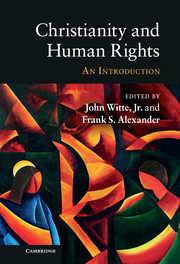Book contents
- Frontmatter
- Contents
- List of contributors
- Acknowledgements
- The first word: to be human is to be free
- Introduction
- FOUNDATIONS AND DEVELOPMENTS OF HUMAN RIGHTS
- 1 The Judaic foundation of rights
- 2 Ius in Roman law
- 3 Human rights and early Christianity
- 4 Human rights in the canon law
- 5 The modern Catholic Church and human rights: the impact of the Second Vatican Council
- 6 Rights and liberties in early modern Protestantism: the example of Calvinism
- 7 Modern Protestant developments in human rights
- 8 The issue of human rights in Byzantium and the Orthodox Christian tradition
- CHRISTIANITY AND THE MODERN HUMAN RIGHTS FRAMEWORK
- Biblical index
- Index
1 - The Judaic foundation of rights
Published online by Cambridge University Press: 05 June 2012
- Frontmatter
- Contents
- List of contributors
- Acknowledgements
- The first word: to be human is to be free
- Introduction
- FOUNDATIONS AND DEVELOPMENTS OF HUMAN RIGHTS
- 1 The Judaic foundation of rights
- 2 Ius in Roman law
- 3 Human rights and early Christianity
- 4 Human rights in the canon law
- 5 The modern Catholic Church and human rights: the impact of the Second Vatican Council
- 6 Rights and liberties in early modern Protestantism: the example of Calvinism
- 7 Modern Protestant developments in human rights
- 8 The issue of human rights in Byzantium and the Orthodox Christian tradition
- CHRISTIANITY AND THE MODERN HUMAN RIGHTS FRAMEWORK
- Biblical index
- Index
Summary
RIGHTS, DUTIES, AND LAW
There is a widespread assumption among scholars that neither natural law nor human rights is inherent to the biblically based Jewish tradition. Yet, as we shall see, these two normative institutions need to be integrated with each other. Human rights need to be structured by a universal law in order to be more than arbitrary local entitlements. Natural law is about the basically interpersonal, rational nature of human beings, of which rights are an essential component. I submit that both intertwined normative institutions are found in the Jewish tradition when it is examined philosophically, and that one cannot be properly understood without the other. Moreover, these intertwined normative institutions can be philosophically integrated with the revealed law (Torah) lying at the heart of Judaism.
Many argue that the idea of natural law came out of ancient Greek philosophy and was only adopted by Judaism during the Hellenistic Age. This synthesis seems rather artificial, though, inasmuch as it does not seem cogently to connect a law revealed by God to humans to a law discovered by humans through the exercise of their natural discursive reason. In this view, anyway, the rational discovery of natural law is already one big move away from the faithful acceptance of revealed law; hence any synthesis of the two is inauthentic historically as well as philosophically.
- Type
- Chapter
- Information
- Christianity and Human RightsAn Introduction, pp. 47 - 63Publisher: Cambridge University PressPrint publication year: 2010
- 2
- Cited by



